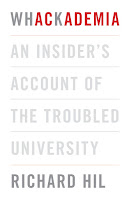Staff Review by Chris Saliba
 Higher education took a nose dive when former Labor Minister John Dawkins orientated universities toward a dry economic business model, according to Richard Hil’s insider account Whackademia. Since then an obsession with running universities like modern day corporations has taken over, pushing the core work of academics to the side. Whackademiaargues that it’s time to re-evaluate the purpose and value of our universities.
Higher education took a nose dive when former Labor Minister John Dawkins orientated universities toward a dry economic business model, according to Richard Hil’s insider account Whackademia. Since then an obsession with running universities like modern day corporations has taken over, pushing the core work of academics to the side. Whackademiaargues that it’s time to re-evaluate the purpose and value of our universities.If you have ever entertained notions of pursuing an academic career then reading Richard Hil’s insider account Whackademia is sure to come as an unpleasant shock. Academic life is no longer taken up with research, writing and teaching but is rather consumed with administrative form filling, business metrics such ‘key performance indicators’ and the language of modern corporate spin. Teachers and academics struggle to find time and sanity to pursue their real vocation of education.
The higher education sector went corporate in 1987 when former Labor Minister for Employment, Education and Training John Dawkins started orientating universities toward a modern business model. The idea was that by embracing dry economics universities would be able to pay their way and not have to rely so much on government funding. Writes Hil:
‘This meant embracing ‘entrepreneurship’ and the practices of setting targets, developing market plans and introducing performance controls: the same organisational approach that had already been widely adopted across industrial sectors in a number of other Western countries.’
Embracing the business model ethos brought with it a push towards attracting as many full-fee paying foreign students as possible, to help bring more cash into the coffers. The deleterious effects of this approach have been twofold: larger class sizes (resulting in an unmanageable workload), and pressure not to fail students. Too many failing grades can result in the teacher being called in to explain themselves. Graduates now complete their higher education with poor writing and communication skills. They are often barely employable.
Such an outcome seems extraordinary, but Hil backs up his argument by quoting industry and business groups who are dismayed by the poor skills of their new hires. Higher education is not creating graduates with the required aptitudes and competencies for the professional world. This is ironic, as the business model that John Dawkins introduced was supposed to create a factory line of perfectly equipped employees, yet business is saying these graduates are seriously lacking.
One of the biggest complaints Whackademia makes is the new overload of administrative tasks to be dealt with. Academics now drown under an ocean of forms filling duties, many of them exceedingly complicated and attended by umpteen pages of explanatory notes. The digital revolution has made matters only worse, shifting tasks once performed by admin staff to academics. Teachers now spend all their time performing these mind-numbing tasks, rather than on quality of education.
This sounds all very gloomy and frustrating, but Hil writes with much good humour and energy. His book is accessible to the non-specialist and all the arguments are set out lucidly. There’s also a useful bibliography at the back for further research.
Why write Whackademia and risk the opprobrium of university peers and superiors? After spending decades as an academic, and seeing the university’s culture shift from the laudable to the lamentable, Hil hopes to create discussion and make change by speaking out. While the book is critical of a lot of modern day university practices, he does admit that there is still a lot of good academic work being done.
No comments:
Post a Comment